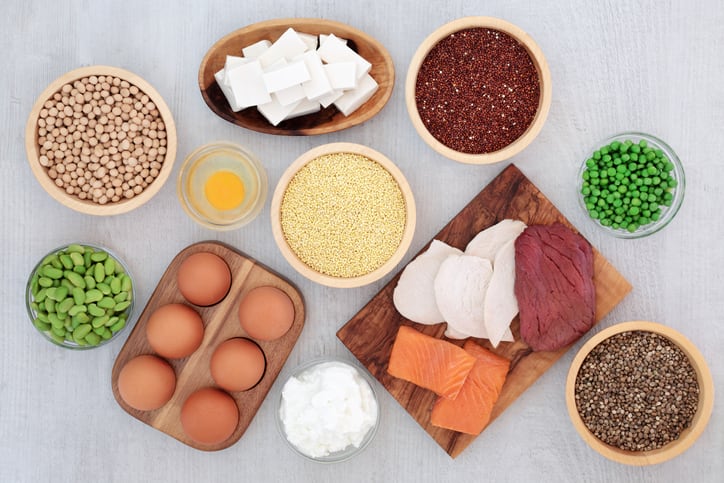It is largely believed that plant-based sources or protein are inferior to animal sources in their capacity to stimulate muscle protein synthesis rates due to their typically slower digestibility, lower bioavailability, and lower essential amino acid and leucine content. Whey protein has been shown to stimulate muscle protein synthesis rates to a greater extent than soy in young men, and compared to wheat protein in older men. To date, however, these are the only non animal-derived protein sources to be studied with respect to their impact on muscle protein synthesis.
Mycoprotein is a mushroom-cultivated ingredient rich in protein (45%) and essential amino acids (44%) which also has been shown to provide total postprandial essential amino acid (and leucine) concentrations comparable to that seen following milk protein ingestion, suggesting it could be capable of robustly stimulating muscle protein synthesis rates.
In the current study researchers from the University of Exeter, England, decided to compare the effect of leucine-matched portions of mycoprotein and milk protein beverages on muscle growth rates. They hypothesised that despite equivalent leucine contents, due to slower aminoacidemia, muscle protein synthesis rates would increase less following mycoprotein ingestion.
However, they were surprised to find that mixed muscle fractional protein synthetic rates (FSRs) increased to a greater extent following mycoprotein consumption.
The report states: "Mycoprotein ingestion resulted in slower and lower rises in plasma amino acid (and leucine) concentrations compared with the ingestion of milk protein. Despite this, and contrary to our secondary hypothesis, we report that mycoprotein ingestion stimulated muscle protein synthesis rates to a greater extent when compared with milk protein."
Methods
Twenty resistance-trained healthy young males (aged 21-23) took part in a randomised, double-blind, parallel-group study. Participants ingested either 31 g (26.2 g protein: 2.5 g leucine) milk protein beverage or 70 g (31.5 g protein: 2.5 g leucine) mycoprotein beverage following a bout of unilateral resistance-type exercise (contralateral leg acting as resting control).
They chose to match the two beverages on leucine content as previous studies have suggested leucine content, rather than total protein, is the primary factor determining the postprandial muscle protein synthetic response when sufficient protein is consumed.
Blood and m. vastus lateralis muscle samples were collected before exercise and protein ingestion, and following a four hour postprandial period to assess mixed muscle FSRs and myocellular signaling in response to the beverages in resting and exercised muscle.
The researchers note that not only did the mycoprotein ingestion lead to increased FSRs but also that the change in muscle protein synthesis rate was more than double in the mycoprotein group, compared to the milk protein group.
The report states: "Moreover, when expressing these data as the change in muscle protein synthesis rates from postabsorptive to postprandial, the response to mycoprotein ingestion was more than double that of milk protein ingestion. Given this response occurred despite “inferior” postprandial plasma amino acid kinetics, it is of interest to consider why this was observed."
The researchers hypothesise that the reason for this may because mycoprotein is high in fiber and has a higher energy content. It has previously been suggested that isolated protein sources, with little or no additional macronutrients, provide lower rates of muscle protein synthesis than protein sources consumed as part of a complete food matrix.
However the researchers do point out that the results may have been affected by the fact that the dose of mycoprotein did contain around 15g more protein due to the matching of leucine content.However the authors conclude that the study shows mycoprotein represents a viable, sustainably produced nonanimal-derived alternative dietary protein source to support acute tissue remodeling in response to exercise.





